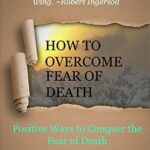There is no one-size-fits-all answer to this question, as everyone experiences fear and anxiety differently and what works for one person may not work for another. However, some general tips on how to overcome fear and anxiety include:
1. Identify your triggers.
What situations, people, or things tend to make you feel anxious? Once you know your triggers, you can start to develop a plan for how to deal with them.
2.Challenge your negative thoughts.
When you’re feeling anxious, it’s easy to fall into a pattern of negative thinking. Instead, try to challenge these thoughts by asking yourself if they’re really true. Are you really in danger?
Is the situation as bad as you’re making it out to be?
3.Focus on the present moment. One of the best ways to combat anxiety is to focus on the here and now rather than worrying about what could happen in the future.
Pay attention to your senses and what’s happening around you in the present moment. This can help ground you and prevent you from getting caught up in anxious thoughts.
4..
Breathe deeply .
- Identify your fear: The first step is to identify what it is that you’re afraid of
- This can be difficult to do because sometimes our fears are irrational and we don’t even know why we’re afraid
- Once you identify your fear, you can start to work on overcoming it
- Face your fear: After you’ve identified your fear, the next step is to face it
- This doesn’t mean that you have to put yourself in a situation where you’re guaranteed to be scared, but it does mean that you need to confront your fear head-on
- Often, the act of facing our fears is enough to help us overcome them
- Create a plan: Once you’ve faced your fear, the next step is to create a plan for how you will deal with it the next time it comes up
- This plan should include both short-term and long-term strategies for dealing with your fear
- Practice what you’ve learned: The final step in overcoming fear and anxiety is to practice what you’ve learned
- This means using the strategies from your plan when confronted with situations that make you anxious or fearful
- By practicing these techniques, you can eventually overcome your fears completely
How To Overcome Fear And Anxiety In 30 Seconds
How Can I Train My Mind to Overcome Fear?
There is no one-size-fits-all answer to this question, as the best way to train your mind to overcome fear will vary depending on the individual. However, there are some general tips that can be useful in helping you to overcome your fears.
One of the most important things you can do is to identify what it is that you are afraid of.
Once you know what your fear is, you can start to work on overcoming it. It may be helpful to talk to someone else about your fear, as this can help you to better understand it and see it from a different perspective.
You should also try to face your fear head-on rather than avoiding it.
This may mean gradually exposing yourself to the thing you are afraid of, or confronting it directly if possible. It is important not to force yourself into doing something if you feel too scared, but instead take things at a pace that feels comfortable for you.
It can also be helpful to practice relaxation techniques such as deep breathing or meditation, as these can help you to control your anxiety levels and make it easier to deal with your fears.
If your fear is affecting your daily life then it may be worth seeking professional help from a therapist or counselor who can offer more specific advice and support.
What are 3 Coping Strategies for Anxiety?
There are many coping strategies for anxiety, but three of the most effective ones are self-care, relaxation, and positive thinking.
Self-care involves taking care of yourself both physically and emotionally. This means eating healthy foods, getting enough sleep, and exercising regularly.
It also means taking breaks when you feel overwhelmed and spending time with supportive people.
Relaxation techniques can help you calm your mind and body in the moment. Some examples include deep breathing, progressive muscle relaxation, and guided imagery.
Positive thinking means reframing your thoughts to focus on the good instead of the bad. When you’re feeling anxious, try to think about things that make you happy or things that you’re grateful for. This will help shift your focus away from your worries.
What is the Best Way to Deal With Anxiety?
There is no one-size-fits-all answer to this question, as the best way to deal with anxiety will vary from person to person. However, there are some general tips that can help to manage and reduce anxiety levels.
Firstly, it can be helpful to identify any situations or activities that trigger your anxiety.
Once you know what these are, you can try to avoid them or prepare for them in advance so that they don’t take you by surprise. It may also be helpful to come up with a relaxation plan for when you are feeling anxious. This could involve things like deep breathing exercises, listening to calming music, or spending time in nature.
If your anxiety is severe or impacting your day-to-day life, it’s important to seek professional help. A therapist will be able to work with you to develop an effective treatment plan that addresses the root cause of your anxiety. If medication is required, they will also be able to prescribe the appropriate medication and monitor its effects.
What are the 5 Steps to Conquer Fear?
When it comes to conquering fear, there is no one-size-fits-all approach. However, there are some basic steps that can help you overcome your fears and live a more courageously. Here are 5 steps to conquer fear:
1. Identify your fears. The first step to conquering your fears is to identify what they are. Once you know what your fears are, you can start to address them head-on.
2. Face your fears head-on. Once you know what your fears are, it’s time to face them directly. This means confronting the things or situations that make you feel scared or anxious.
It may be difficult at first, but facing your fears is an important part of overcoming them.
3 .Talk about your fears with someone else .
Another helpful step in conquering fear is talking about it with someone else . When we share our experiences and feelings with others , we often find that we’re not alone in our struggles . This can provide us with valuable support and perspective as we work through our fears .
4 . Create a plan of action . Once you’ve identified and faced your fears , the next step is to create a plan of action for how you’ll deal with them .
This might involve developing new coping mechanisms or seeking professional help if needed . Having a solid plan in place will give you confidence as you move forward towards conquering your fear s once and for all . What works best may vary from person to person so be sure experiment until finding something that gives results..

Credit: www.youtube.com
How to Overcome Fear And Anxiety Spiritually
Fear and anxiety are two of the most common emotions that people experience. They are also two of the most difficult to deal with. If you’re someone who struggles with fear and anxiety, you may feel like you’re at a loss as to how to overcome these emotions.
But there is hope! Here are some tips on how to overcome fear and anxiety spiritually: 1. Pray or meditate regularly.
Prayer and meditation can help you connect with your higher power and find inner peace. When you’re feeling anxious or afraid, take a few minutes to pray or meditate. This can help calm your mind and ease your fears.
2. Seek out supportive relationships. Surround yourself with people who love and support you. These positive relationships will provide strength and comfort when you’re feeling vulnerable.
3. Spend time in nature. Nature has a way of calming the soul and helping us feel connected to something larger than ourselves.
Read more: Homeowners insurance reviews from Liberty Mutual for homeowners
How to Remove Fear from Mind And Heart
Fear is an emotion that we all experience at some point in our lives. It is a normal reaction to a perceived threat and can help us to stay safe in dangerous situations. However, sometimes fear can become excessive and start to interfere with our daily lives.
When this happens, it is important to find ways to manage or remove fear from our mind and heart.
There are a number of different techniques that can be used to do this. One popular method is cognitive behavioral therapy (CBT), which helps people to identify and challenge the negative thoughts and beliefs that contribute to their fear.
Other approaches include exposure therapy, where people gradually face their fears in a controlled and safe environment, and relaxation techniques such as yoga or meditation, which can help to calm the mind and body.
Making lifestyle changes can also be helpful in reducing fear. Exercise has been shown to reduce stress levels and improve mental health, both of which can help to ease anxiety and promote feelings of wellbeing.
Eating a healthy diet, getting enough sleep, and avoiding drugs and alcohol can also make a big difference.
If you are struggling with excessive fear or anxiety, it is important to seek professional help. A therapist will be able to assess your individual situation and provide you with the tools and support you need to overcome your fears.
How to Overcome Fear And Anxiety in 30 Seconds
If you’re like most people, you’ve probably experienced fear and anxiety at some point in your life. Maybe it was during a public speaking engagement, or perhaps it was while taking a test. Whatever the case may be, fear and anxiety can be very debilitating.
The good news is that there are ways to overcome fear and anxiety in just 30 seconds. Here are three tips:
1. Take deep breaths.
Breathing deeply helps to relax the body and mind, which can reduce fear and anxiety.
2. Repeat positive affirmations to yourself. Telling yourself that you’re capable and strong can help to boost your confidence and decrease your fears.
3. Visualize yourself succeeding. See yourself overcoming whatever it is that you’re afraid of, and know that you can do it!
Conclusion
If you’re struggling with fear and anxiety, know that you’re not alone. Many people deal with these issues on a daily basis. The good news is that there are things you can do to overcome your fears and anxiety.
Here are four tips:
1. Identify your triggers. What situations or activities make you feel anxious?
Once you know what your triggers are, you can work on avoiding them or learning how to cope with them in a healthy way.
2. Challenge your negative thoughts. When you’re feeling anxious, it’s easy to fall into a spiral of negative thinking.
But instead of letting your thoughts control you, take back the power by challenging them. Ask yourself if there’s any evidence to support your negative beliefs. If not, let them go!
3 . Practice relaxation techniques . There are many different ways to relax, so find one that works for you and practice it regularly .
Whether it’s deep breathing exercises , meditation , or yoga , taking time out to relax will help reduce your overall stress levels and make it easier to cope with anxiety when it does crop up .
4 . Seek professional help .







